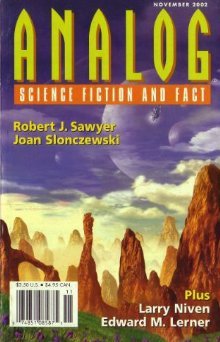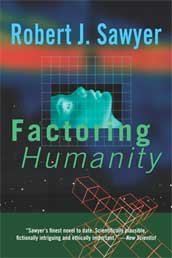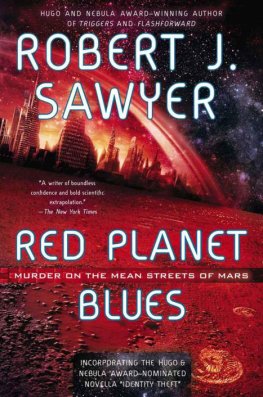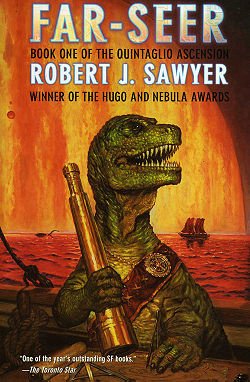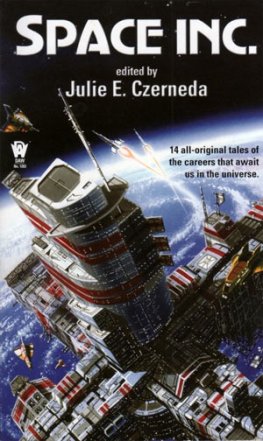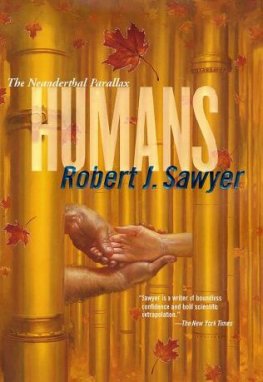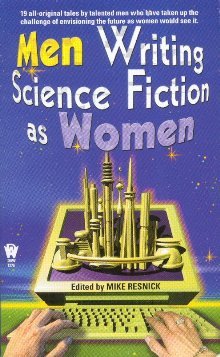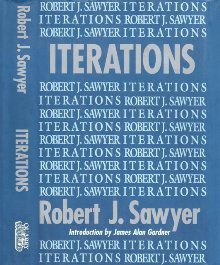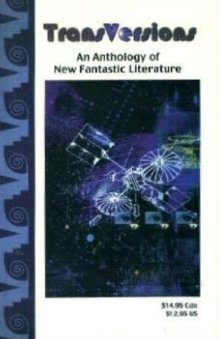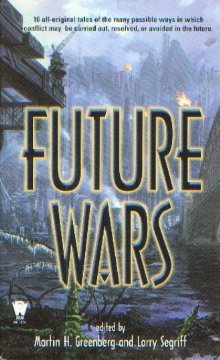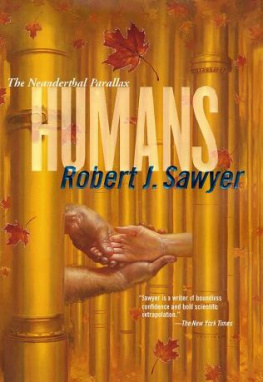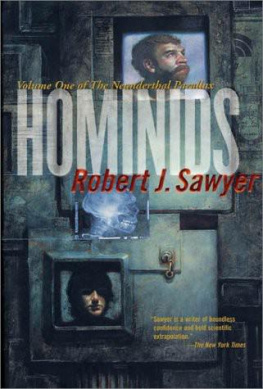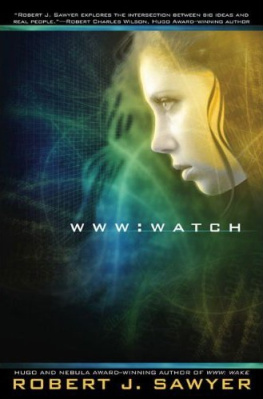Robert Sawyer - Hominids
Here you can read online Robert Sawyer - Hominids full text of the book (entire story) in english for free. Download pdf and epub, get meaning, cover and reviews about this ebook. genre: Science fiction. Description of the work, (preface) as well as reviews are available. Best literature library LitArk.com created for fans of good reading and offers a wide selection of genres:
Romance novel
Science fiction
Adventure
Detective
Science
History
Home and family
Prose
Art
Politics
Computer
Non-fiction
Religion
Business
Children
Humor
Choose a favorite category and find really read worthwhile books. Enjoy immersion in the world of imagination, feel the emotions of the characters or learn something new for yourself, make an fascinating discovery.

- Book:Hominids
- Author:
- Genre:
- Rating:3 / 5
- Favourites:Add to favourites
- Your mark:
- 60
- 1
- 2
- 3
- 4
- 5
Hominids: summary, description and annotation
We offer to read an annotation, description, summary or preface (depends on what the author of the book "Hominids" wrote himself). If you haven't found the necessary information about the book — write in the comments, we will try to find it.
Hominids — read online for free the complete book (whole text) full work
Below is the text of the book, divided by pages. System saving the place of the last page read, allows you to conveniently read the book "Hominids" online for free, without having to search again every time where you left off. Put a bookmark, and you can go to the page where you finished reading at any time.
Font size:
Interval:
Bookmark:
Robert J. Sawyer
Hominids
Chapter One
DAY ONE FRIDAY, AUGUST 2 148/118/24
The blackness was absolute.
Watching over it was Louise Benoit, twenty-eight, a statuesque postdoc from Montreal with a mane of thick brown hair stuffed, as required here, into a hair net. She kept her vigil in a cramped control room, buried two kilometers-a mile an a quarder, as she sometimes explained for American visitors in an accent that charmed them-beneath the Earths surface.
The control room was next to the deck above the vast, unilluminated cavern housing the Sudbury Neutrino Observatory. Suspended in the center of that cavern was the worlds largest acrylic sphere, twelve meters-almost fordy feet-across. The sphere was filled with eleven hundred tonnes of heavy water on loan from Atomic Energy of Canada Limited.
Enveloping that transparent globe was a geodesic array of stainless-steel struts, supporting 9,600 photomultiplier tubes, each cupped in a reflective parabola, each aimed in toward the sphere. All of this-the heavy water, the acrylic globe that contained it, and the enveloping geodesic shell-was housed in a ten-story-tall barrel-shaped cavern, excavated from the surrounding norite rock. And that gargantuan cavern was filled almost to the top with ultrapure regular water.
The two kilometers of Canadian shield overhead, Louise knew, protected the heavy water from cosmic rays. And the shell of regular water absorbed the natural background radiation from the small quantities of uranium and thorium in the surrounding rock, preventing that, too, from reaching the heavy water. Indeed, nothing could penetrate into the heavy water except neutrinos, those infinitesimal subatomic particles that were the subject of Louises research. Trillions of neutrinos passed right through the Earth every second; in fact, a neutrino could travel through a block of lead a light-year thick with only a fifty-percent chance of hitting something.
Still, neutrinos poured out of the sun in such vast profusion that collisions did occasionally occur-and heavy water was an ideal target for such collisions. The hydrogen nuclei in heavy water each contain a proton-the normal constituent of a hydrogen nucleus-plus a neutron, as well. And when a neutrino did chance to hit a neutron, the neutron decayed, releasing a proton of its own, an electron, and a flash of light that could be detected by the photomultiplier tubes.
At first, Louises dark, arching eyebrows did not rise when she heard the neutrino-detection alarm go ping, the alarm sounded briefly about a dozen times a day, and although it was normally the most exciting thing to happen down here, it still didnt merit looking up from her copy of Cosmopolitan.
But then the alarm sounded again, and yet again, and then it stayed on, a solid, unending electric bleep like a dying mans EKG.
Louise got up from her desk and walked over to the detector console. On top of it was a framed picture of Stephen Hawking-not signed, of course. Hawking had visited the Sudbury Neutrino Observatory for its grand opening a few years ago, in 1998. Louise tapped on the alarms speaker, in case it was on the fritz, but the keening continued.
Paul Kiriyama, a scrawny grad student, dashed into the control room, arriving from elsewhere in the vast, underground facility. Paul was, Louise knew, usually quite flustered around her, but this time he wasnt at a loss for words. What the hecks going on? he asked. There was a grid of ninety-eight by ninety-eight LEDs on the detector panel, representing the 9,600 photomultiplier tubes; every one of them was illuminated.
Maybe someone accidentally turned on the lights in the cavern, said Louise, sounding dubious even to herself.
The prolonged bleep finally stopped. Paul pressed a couple of buttons, activating five TV monitors slaved to five underwater cameras inside the observatory chamber. Their screens were perfectly black rectangles. Well, if the lights were on, he said, theyre off now. I wonder what-
A supernova! declared Louise, clapping her long-fingered hands together. We should contact the Central Bureau for Astronomical Telegrams; establish our priority. Although SNO had been built to study neutrinos from the sun, it could detect them from anywhere in the universe.
Paul nodded and plunked himself down in front of a [18] Web browser, clicking on the bookmark for the Bureaus site. It was worth reporting the event, Louise knew, even if they werent yet sure.
A new series of pings sounded from the detector panel. Louise looked at the LED board; several hundred lights were illuminated all over the grid. Strange, she thought. A supernova should register as a directional source
Maybe somethings wrong with the equipment? said Paul, clearly reaching the same conclusion. Or maybe the connection to one of the photomultipliers is shorting out, and the others are picking up the arc.
The air split with a creaking, groaning sound, coming from next door-from the deck atop the giant detector chamber itself. Perhaps we should turn on the chamber lights, said Louise. The groaning continued, a subterranean beast prowling in the dark.
But what if it is a supernova? said Paul. The detector is useless with the lights on, and-
Another loud cracking, like a hockey player making a slap shot. Turn on the lights!
Paul lifted the protective cover on the switch and pressed it. The images on the TV monitors flared then settled down, showing Mon dieu, declared Louise.
Theres something inside the heavy-water tank! said Paul. But how could-?
Did you see that? said Louise. Its moving, and-good Lord, its a man!
The cracking and groaning sounds continued, and then They could see it on the monitors and hear it coming through the walls.
The giant acrylic sphere burst apart along several of the seams that held its component pieces together. Tabernacle, Louise swore, realizing the heavy water must now be mixing with the regular H 2 O inside the barrel-shaped chamber. Her heart was jackhammering. For half a second, she didnt know whether to be more concerned about the destruction of the detector or about the man who was obviously drowning inside it.
Come on! said Paul, heading for the door leading to the deck above the observatory chamber. The cameras were slaved to VCRs; nothing would be missed.
Un moment, said Louise. She dashed across the control room, grabbed a telephone handset, and pounded out an extension from the list taped to the wall.
The phone rang twice. Dr. Montego? said Louise, when the Jamaican-accented voice of the mine-site physician came on. Louise Benoit here, at SNO. We need you right away down at the neutrino observatory. Theres a man drowning in the detector chamber.
A man drowning? said Montego. But how could he possibly get in there?
We dont know. Hurry!
Im on my way, said the doctor. Louise replaced the handset and ran toward the same blue door Paul had gone through earlier, which had since swung shut. She knew the signs on it by heart:
Keep Door Closed
Danger: High Voltage Cables
No Unauthorized Electronic Equipment Beyond This Point
Air Quality Checked-Cleared for Entry
Louise grabbed the handle, pulling the door open, and hurried onto the wide expanse of the metal deck.
There was a trapdoor off to one side leading down to the actual detector chamber; the final construction worker had exited through it, and had sealed it shut behind him. To Louises astonishment, the trapdoor was still sealed by forty separate bolts-of course, it was supposed to be sealed, but there was no way a man could have gotten inside except through that trapdoor
The walls surrounding the deck were covered with dark green plastic sheeting to keep rock dust out. Dozens of conduits and polypropylene pipes hung from the ceiling, and steel girders sketched out the shape of the room. Computing equipment lined some walls; others had shelves. Paul was over by one of the latter, desperately rummaging around, presumably for pliers strong enough to crank the bolts free.
Font size:
Interval:
Bookmark:
Similar books «Hominids»
Look at similar books to Hominids. We have selected literature similar in name and meaning in the hope of providing readers with more options to find new, interesting, not yet read works.
Discussion, reviews of the book Hominids and just readers' own opinions. Leave your comments, write what you think about the work, its meaning or the main characters. Specify what exactly you liked and what you didn't like, and why you think so.

